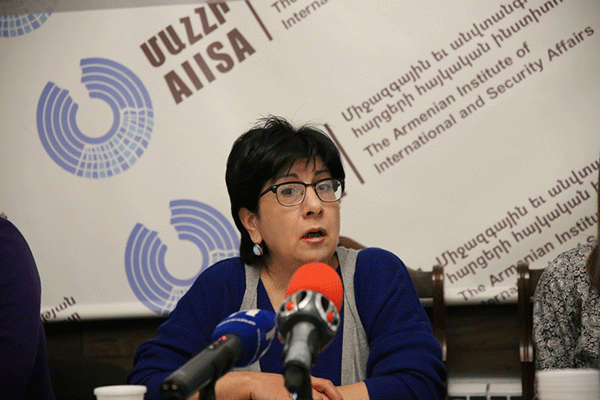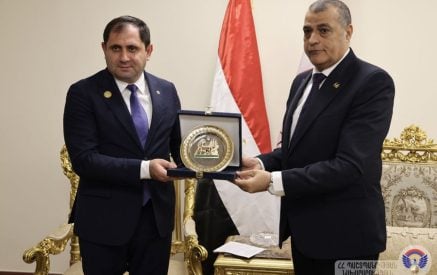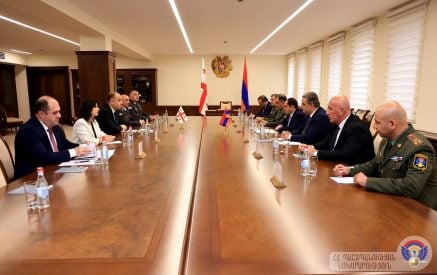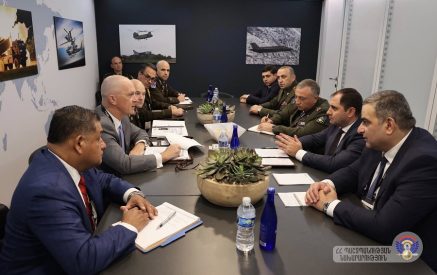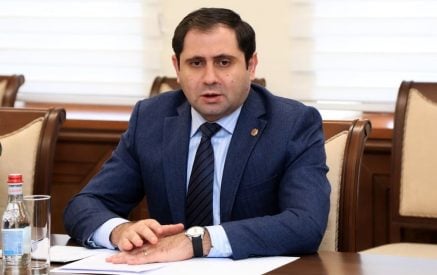A roundtable was invited on “Nation-Army: From Media Discourse to Public Perception” topic at the Armenian Institute of International and Security Affairs, yesterday. The guests were the experts of the field. The leader of “Region” research center, Laura Baghdasaryan presented the perceptions of “Nation-Army” concept in media. The research has been made from January to October 2017. Consequently, the publications about “Nation-Army” amount to 62% of all materials. The TV channels have actively covered that topic. It has been included not only in media programs but also in talk shows, social clips, and TV series. The majority of the media publications presented the topic from a neutral perspective, as daily news. The representatives of the NGOs, specialists of the field have criticized the new concept on social media, and other representatives of those groups have talked positively about it as much as the state officials did on TV.
Laura Baghdasaryan presented what perceptions the society possessed after April War: “Armenia’s population is few in number, 2-year compulsory army service is in force in the Republic of Armenia and there are very few families which have never had any connection with the army. We are a society traditionally always sensitive and attentive towards the problems of the army and the mentioned was intensified April 2016 forward, in particular.”
She mentioned that the people were inclined towards thinking that the army is the guarantor of our security before April War. After the war, they started to think the army is our sole guarantor.
After the War, the public got to know about manifold army issues via social networks which brought about a shocking shift in its perception of the army: “In public perception, the army was the only sustained institution and it was difficult to accept that that very sustained institution had shortcomings and errs which were revealed.”
Baghdasaryan said that “Nation-Army” concept was not accepted by the society, inasmuch as there were a set of abrupt social questions in place: “It coincided with the law on 1000 drams, and the society started to perceive the provisions of “Nation-Army”, which were indeed aimed at army reforms on regulating manifold relations, such as the regulation of who would be in charge of conscription starting from delivery, consolidation between the army and the economy – approaches seeming normal and positive from the first sight, very negatively. The biggest mistake of “Nation-Army” concept developers was in starting the changes from the law on 1000 drams.”
Secondly, that concept was suggested in line with also the restriction of the right to deferment, which actually presupposed its total abolition: “The debates and the discussions developed in a snowball effect, an issue was bringing forth another issue. For example, the restriction of the right to deferment evolved into the topic of the army service escape. The army service topic, in turn, snowballed into issues of inner political character, i.e. why the Minister of Defence put the “Nation-Army” concept into circulation, which might come to life after the change of the governance model in April.”
As stated by Ms. Baghdasaryan, the restriction of the right to deferment revealed also a row of problems in the education field and an unprecedented number of references were made to the science and education field on media.
Laura Baghdasaryan referred also to Minister of Defence, Vigen Sargsyan’s interview to Razm.info, where he mentioned with pain, that a regress relative to the army in public discourse was in place.
Ms. Baghdasaryan denied the statement about the regress: “It is his perception. There is no regress present. There is a critical approach and the romantic perceptions of the army have converted into more realistic things. Anyone who has had a personal connection with the army has sent packages to the soldiers, is familiar with army issues from within, now everything is disclosed simply. This is a very good tendency of recovery.”
Hripsime JEBEJYAN



















































